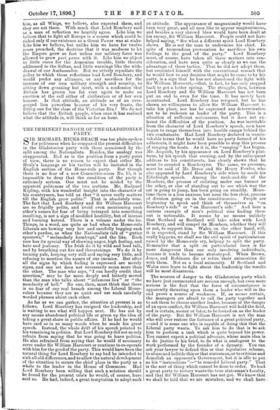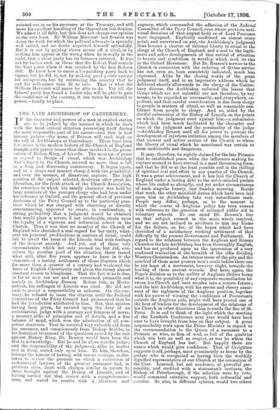THE IMMINENT DANGER OF THE GLAD STONIAN PARTY.
SIR MICHAEL HICKS-BEACH was too plain-spoken for politeness when he compared the present difficulties in the Gladstonian party with those occasioned by the split among the Nationalists. Besides, the analogy was exaggerated. Bad as is the position from a party point of view, there is no reason to expect that either Mr. Healy's language or his tactics will be imitated in the English section of the Home-rule party. But though there is no fear of a new Committee-room No. 15, it is impossible to deny that the condition of the party is extremely serious. One must not be misled by the apparent politeness of the two sections. Mr. Rudyard Kipling, with his wonderful insight into the character of his countrymen, has told us that "it never really matters till the English grow polite." That is absolutely true. The fact that Lord Rosebery and Sir William Harcourt are so frigidly polite, and avoid even mentioning each other's names for fear of being betrayed into something insulting, is not a sign of modified hostility, but of intense and burning hatred. There is a volcano under the ice. Things, in a word, are quite as bad when the Home-rule Liberals are bowing very low and carefully begging each other's pardon, as when the Nationalists talk of "gutter sparrows," "melancholy humbugs," and the like. Each race has its special way of showing anger, high feeling, and hate and jealousy. The Irish do it by wild said loud talk, and by breathing out fire and threatenings. We do it by turning pale, keeping very still and saying very little, and refusing to mention the names of our enemies. But after all the signs by which feeling is expressed are merely signs, and one set does not necessarily mean more than the other. The man who says, "I can hardly credit that assertion," may be far more deeply and bitterly moved than the man who talks about "infamous lies" or "the mendacity of hell." No one, then, must think that there is no fear of any real breach among the Liberal Home- rulers because they are so quiet and use such carefully worded phrases about each other.
As far as we can gather, the situation at present is as follows. Lord Rosebery has resigned the leadership, and is waiting to see what will happen next. He has not by any means abandoned political life or given up the idea of taking a great share in public affairs. If he had he would have said so in so many words when he made his great speech. Instead, the whole drift of his speech pointed to his remaining in politics. But Lord Rosebery did not merely refrain from saying that he was going to leave politics. He also refrained from saying that he would if necessary serve under Sir William Harcourt or continue to co-operate with him for the good of the party. This would have been the natural thing for Lord Rosebery to say had he intended to sink all old differences, and to allow the natural development of the situation to secure the chief place in the party as a whole to the leader in the House of Commons. Had Lord Rosebery been willing that such a solution should be found for the present crisis he would, of course, have said so. He had, indeed, a great temptation to adopt such an attitude. The appearance of magnanimity would have been very great, and all men like to appear magnanimous, and besides a very shrewd blow would have been dealt at his enemy, Sir William Harcourt. People could not have- helped saying, " See what a different spirit Lord Rosebery. shows. He is not the man to undermine his chief. In. spite of tremendous provocation he sacrifices his own. feelings to the good of the party." Lord Rosebery. must, of course, have taken all these matters into con- sideration, and have seen quite as clearly as we can the advantage of these tactics. That he did not adopt them, but contented himself with the conventional remark that he would bow to any decision that might be come to by his party, is a sign that he has not abandoned the fight with. Sir 'William Harcourt,—that, in fact, he has only stepped back to get a better spring. The struggle, then, between Lord Rosebery and Sir William Harcourt has not been put an end to even for the time. It has merely been accentuated. Lord Rosebery has resigned, but he has - shown no willingness to allow Sir William Harcourt to take his place, nor has he expressed any determination not to be rechosen as leader of the party. This is a situation of sufficient seriousness, but it does not ex- haust the difficulties of the position. As was inevitable from the character of Lord Rosebery's speech, men have• begun to range themselves into hostile camps behind the two combatants. Had Lord Rosebery declared in unmis- takable terms that he would have no party formed of his adherents, it might have been possible to stop this process of ranging the hosts. As it is, the " ranging " has begun. Mr. Asquith, by his appearance on Lord Rosebery's plat- form, by his speech that evening, and by the subsequent address to his constituents, has clearly shown that he must be counted a Roseberyite. The same, we presume,. must be said of Mr. Bryce and Sir Henry Fowler, who. also appeared by Lord Rosebery's side when be made his Edinburgh speech. Among the rank-and-file of the Members, the process of enlisting under one banner or the other, or else of standing out to see which way the. cat is going to jump, has been going on steadily. Mean- time there is a less anxious, but none the less clear, process. ofdivision going on in the constituencies. People are beginning to speak and think of themselves as "on Rosebery's side" or "on Harcourt's side." And here a. curious example of men's political sins finding them out is noticeable. It seems by no means unlikely. that Scotland as Scotland will take sides with Lord Rosebery, and will compel its Members, whether they will or not, to support him. Wales, on the other hand, will, it is expected, stand by Sir William Harcourt. If this really happens, we shall see the evil spirit of particularism raised by the Home-rule cry, helping to split the party. Remember that a split on particularist lines is far• more dangerous than one only involving individuals, because it tends to become stereotyped. When Brown, Jones, and Robinson die or retire their animosities die with them. Not SQ a local animosity. If Scotland and Wales once learn to fight about the leadership the results will be most disastrous.
The sources of danger to the Gladstonian party which we have just enumerated are serious enough, but even more serious is the fact that the force of circumstances is apparently thrusting upon them a leader who will in the end prove a source of weakness. If, as seems certain, the managers are afraid to call the party together and to ask them to choose another leader, because of the danger of an open conflict, Sir William Harcourt will hold the field, and is certain, sooner or later, to be looked on as the leader of the party. But Sir William Harcourt is not the man who will ever restore the fortunes of a great political party,. —and it is some one who is capable of doing this that the Liberal party wants. To ask him to do that is to ask him to perform a task which is quite beyond his power. _ You cannot expect a political advocate, whose main idea is to do justice to his brief, to do what is analogous to the- work performed by the founder of a dynasty. You can ask your lawyer to defend this or that legislative scheme, to abuse and belittle this or that statesman, or to criticise and demolish an opponent's Government, but it is idle to put. as his "instructions "—" to remodel Liberal party.' That. is the sort of thing which cannot be done to order. To lead a great party to victory wants the true statesman's faculty, and that Sir William Harcourt has not got. We know that we shall be told that we are mistaken, and we shall have_: pointed out to us his successes at the Treasury, and still more his excellent handling of the Opposition last Session. We admit it all fully, but this does not change our opinion in the very least. Sir William Harcourt last Session was doing the work for which the political advocate is specially well suited, and no doubt acquitted himself splendidly. But it is not by gaining clever scores off a rival, or by making him appear in the wrong when he is really in the right, that a great party has its fortunes restored. It was not by tactics such as these that Sir Robert Peel remade the Tory party when it was crushed by the first Reform Bill. He knew how to nurse a languishing party back to vigour, but he did it, not by making good points against his antagonists, but by convincing the country that be and his colleagues were fit to rule. That is what Sir William Harcourt will never be able to do. Yet till the Liberal party has found a leader who will be able to gain the confidence of the country, it can never be restored to power,—hardly to place.







































 Previous page
Previous page